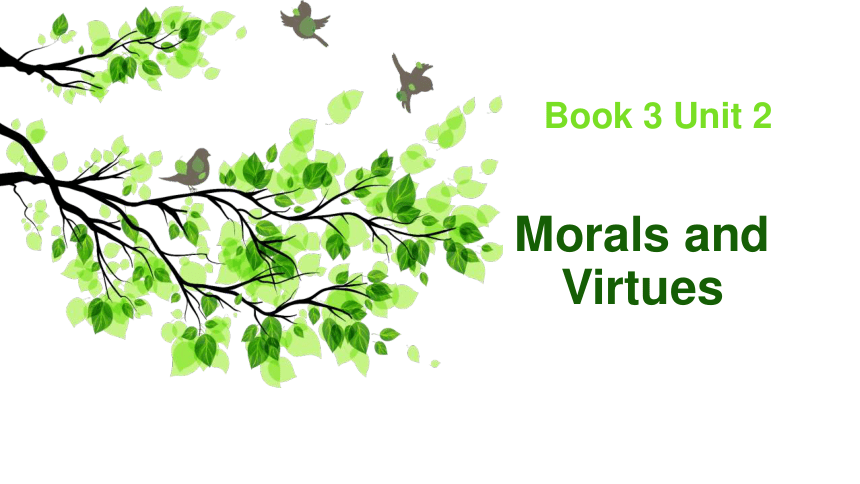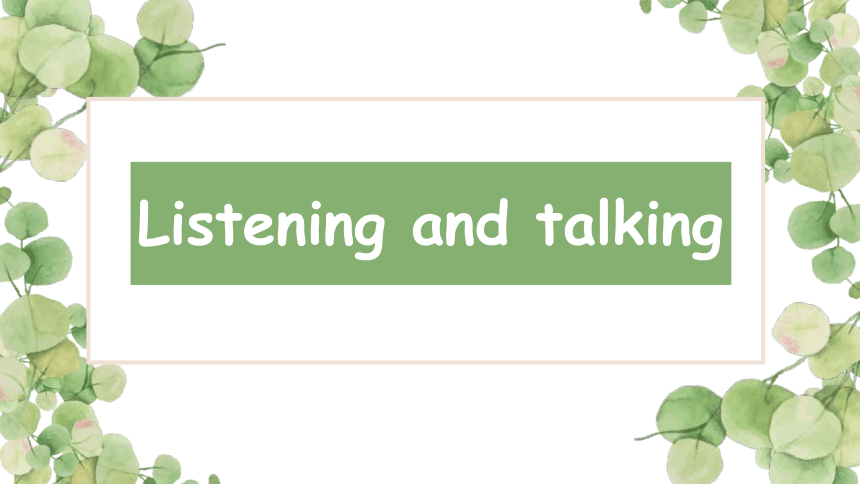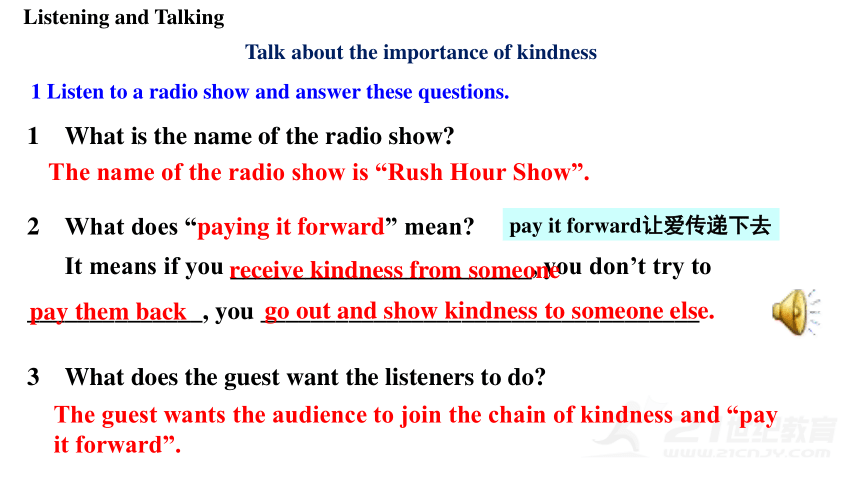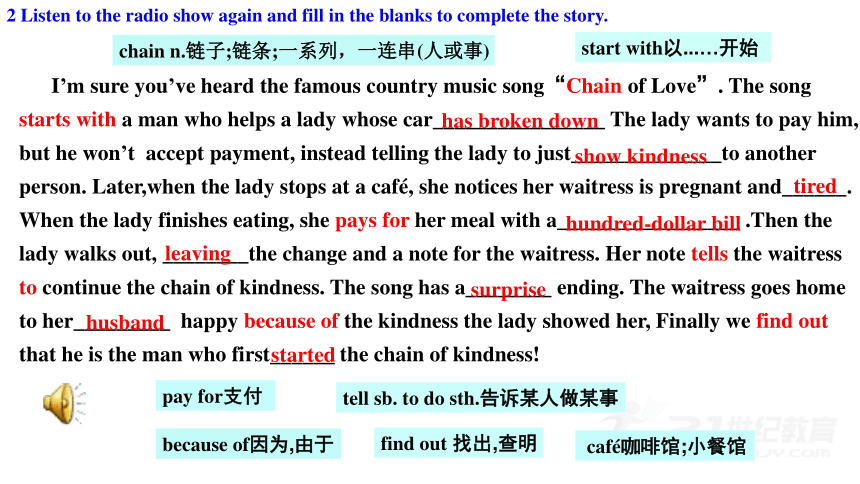人教版(2019)必修第三册Unit2 Morals and Virtues Listening and Talking 课件(共11张PPT)
文档属性
| 名称 | 人教版(2019)必修第三册Unit2 Morals and Virtues Listening and Talking 课件(共11张PPT) |  | |
| 格式 | zip | ||
| 文件大小 | 35.4MB | ||
| 资源类型 | 教案 | ||
| 版本资源 | 人教版(2019) | ||
| 科目 | 英语 | ||
| 更新时间 | 2023-04-03 14:32:39 | ||
图片预览





文档简介
(共11张PPT)
Morals and Virtues
Book 3 Unit 2
Listening and talking
1 What is the name of the radio show
2 What does “paying it forward” mean
It means if you ________________________, you don’t try to ______________, you ___________________________________
3 What does the guest want the listeners to do
The name of the radio show is “Rush Hour Show”.
go out and show kindness to someone else.
The guest wants the audience to join the chain of kindness and “pay it forward”.
Listening and Talking
Talk about the importance of kindness
1 Listen to a radio show and answer these questions.
Listening
pay it forward让爱传递下去
receive kindness from someone
pay them back
I’m sure you’ve heard the famous country music song“Chain of Love”. The song starts with a man who helps a lady whose car________________ The lady wants to pay him, but he won’t accept payment, instead telling the lady to just______________to another person. Later,when the lady stops at a café, she notices her waitress is pregnant and______. When the lady finishes eating, she pays for her meal with a_________________ .Then the lady walks out, ________the change and a note for the waitress. Her note tells the waitress to continue the chain of kindness. The song has a________ ending. The waitress goes home to her_________ happy because of the kindness the lady showed her, Finally we find out that he is the man who first______ the chain of kindness!
2 Listen to the radio show again and fill in the blanks to complete the story.
started
has broken down
show kindness
tired
hundred-dollar bill
leaving
surprise
husband
Listening
start with以...…开始
pay for支付
tell sb. to do sth.告诉某人做某事
because of因为,由于
find out 找出,查明
chain n.链子;链条;一系列,一连串(人或事)
café咖啡馆;小餐馆
Host:Hello and welcome to the Rush Hour Show, the radio show for your way home. Our guest today is Kevin Miller, with the Pay It Forward Foundation. Welcome, Kevin, so what is “paying it forward”
Kevin: Hi,there. So “paying it forward” means that if you receive kindness from someone, you don’t try to pay them back. Instead, you go out and show kindness to someone else.
Host: Oh, so it’s like helping a stranger. Can you give us an example of how it works
Kevin: Well, I’m sure you’ve heard the famous country song,“The Chain of Love”. The song starts with a man who helps a lady whose car has broken down. The lady wants to pay him, but he won’t accept payment, instead telling the woman to just show kindness to another person. Later, when the lady stops at a café, she notices her waitress is pregnant and tired. When the lady finishes eating, she pays for her meal with a hundred-dollar bill. Then the lady walks out, leaving the change and a note for the waitress. Her note tells the waitress to continue the chain of kindness. The song has a surprise ending. The waitress goes home to her husband, happy because of the kindness the lady showed her. Then we find out that he’s the man who first started the chain of kindness!
听力文本
Listening
Host: What a great story! So does this happen in real life
Kevin: Yes,actually. One woman, after paying for her coffee, then quietly paid for the coffee of the customer behind her. When that customer discovered his coffee had been paid for, paid for the customer behind him. The chain of kindness continued for hours. Nearly 400 people
paid for the coffee of the person behind them!
Host:Wow, that’s amazing. So what can our listeners do to help
Kevin:Well, join the chain of kindness today and join the millions of people who are “paying it forward”!
We never know what light we might spark in others by our kindness.
words and phrase
支付
after that
链子;链条;一系列;一连串(人或事)
每;每一
pay it forward
on one's way to
start with
因为,由于
咖啡馆;小餐馆
either...or
flexible
过去,曾经
find out
therefore
tension
court
Memory test
3 Think of a story of showing or receiving kindness,either your own story or one that you have heard of. Then share it with your group. Here are some words and expressions that may help you.
once upon a time long ago ●I remember this happened when I was ...
first of all then after that ●I was on my way to... later finally so ●I was sitting... when...
however although but ●It was a ... day/morning
●There were ... on the street ...
Telling a story
Practice
on one's way to 在前......的路上
either or adv. 不是...…就是...…,…..或…,要么…...要么…...
once upon a time 过去,曾经
after that自那以后
Tell a story
When telling a story, you can start by saying what the story is about. Give the background to the listeners, including when and where it took place. Say what
happened step by step and be sure to use correct tenses. Do not forget to use sequencing words or linking words.
Finally, finish your story by saying why it is important to you or why you remember it.
Practice
Once,I did not have money to go to university,and someone paid my
tuition that term. This happened when I was eighteen. My grandmother had
just died,and this had caused my family great expense,so we had no extra
money at all. I did everything I could to raise the money then,but it seemed
hopeless. Then the morning that the tuition was due,someone gave my
mother an envelope with the money. It wasn't their money,and they wouldn' t
say who it was from. It seemed that some stranger had heard about my
money problem and decided to help me. This meant so much to me,as
without it I would not have been able to go to university.
One possible version:
Practice
Morals and Virtues
Book 3 Unit 2
Listening and talking
1 What is the name of the radio show
2 What does “paying it forward” mean
It means if you ________________________, you don’t try to ______________, you ___________________________________
3 What does the guest want the listeners to do
The name of the radio show is “Rush Hour Show”.
go out and show kindness to someone else.
The guest wants the audience to join the chain of kindness and “pay it forward”.
Listening and Talking
Talk about the importance of kindness
1 Listen to a radio show and answer these questions.
Listening
pay it forward让爱传递下去
receive kindness from someone
pay them back
I’m sure you’ve heard the famous country music song“Chain of Love”. The song starts with a man who helps a lady whose car________________ The lady wants to pay him, but he won’t accept payment, instead telling the lady to just______________to another person. Later,when the lady stops at a café, she notices her waitress is pregnant and______. When the lady finishes eating, she pays for her meal with a_________________ .Then the lady walks out, ________the change and a note for the waitress. Her note tells the waitress to continue the chain of kindness. The song has a________ ending. The waitress goes home to her_________ happy because of the kindness the lady showed her, Finally we find out that he is the man who first______ the chain of kindness!
2 Listen to the radio show again and fill in the blanks to complete the story.
started
has broken down
show kindness
tired
hundred-dollar bill
leaving
surprise
husband
Listening
start with以...…开始
pay for支付
tell sb. to do sth.告诉某人做某事
because of因为,由于
find out 找出,查明
chain n.链子;链条;一系列,一连串(人或事)
café咖啡馆;小餐馆
Host:Hello and welcome to the Rush Hour Show, the radio show for your way home. Our guest today is Kevin Miller, with the Pay It Forward Foundation. Welcome, Kevin, so what is “paying it forward”
Kevin: Hi,there. So “paying it forward” means that if you receive kindness from someone, you don’t try to pay them back. Instead, you go out and show kindness to someone else.
Host: Oh, so it’s like helping a stranger. Can you give us an example of how it works
Kevin: Well, I’m sure you’ve heard the famous country song,“The Chain of Love”. The song starts with a man who helps a lady whose car has broken down. The lady wants to pay him, but he won’t accept payment, instead telling the woman to just show kindness to another person. Later, when the lady stops at a café, she notices her waitress is pregnant and tired. When the lady finishes eating, she pays for her meal with a hundred-dollar bill. Then the lady walks out, leaving the change and a note for the waitress. Her note tells the waitress to continue the chain of kindness. The song has a surprise ending. The waitress goes home to her husband, happy because of the kindness the lady showed her. Then we find out that he’s the man who first started the chain of kindness!
听力文本
Listening
Host: What a great story! So does this happen in real life
Kevin: Yes,actually. One woman, after paying for her coffee, then quietly paid for the coffee of the customer behind her. When that customer discovered his coffee had been paid for, paid for the customer behind him. The chain of kindness continued for hours. Nearly 400 people
paid for the coffee of the person behind them!
Host:Wow, that’s amazing. So what can our listeners do to help
Kevin:Well, join the chain of kindness today and join the millions of people who are “paying it forward”!
We never know what light we might spark in others by our kindness.
words and phrase
支付
after that
链子;链条;一系列;一连串(人或事)
每;每一
pay it forward
on one's way to
start with
因为,由于
咖啡馆;小餐馆
either...or
flexible
过去,曾经
find out
therefore
tension
court
Memory test
3 Think of a story of showing or receiving kindness,either your own story or one that you have heard of. Then share it with your group. Here are some words and expressions that may help you.
once upon a time long ago ●I remember this happened when I was ...
first of all then after that ●I was on my way to... later finally so ●I was sitting... when...
however although but ●It was a ... day/morning
●There were ... on the street ...
Telling a story
Practice
on one's way to 在前......的路上
either or adv. 不是...…就是...…,…..或…,要么…...要么…...
once upon a time 过去,曾经
after that自那以后
Tell a story
When telling a story, you can start by saying what the story is about. Give the background to the listeners, including when and where it took place. Say what
happened step by step and be sure to use correct tenses. Do not forget to use sequencing words or linking words.
Finally, finish your story by saying why it is important to you or why you remember it.
Practice
Once,I did not have money to go to university,and someone paid my
tuition that term. This happened when I was eighteen. My grandmother had
just died,and this had caused my family great expense,so we had no extra
money at all. I did everything I could to raise the money then,but it seemed
hopeless. Then the morning that the tuition was due,someone gave my
mother an envelope with the money. It wasn't their money,and they wouldn' t
say who it was from. It seemed that some stranger had heard about my
money problem and decided to help me. This meant so much to me,as
without it I would not have been able to go to university.
One possible version:
Practice
